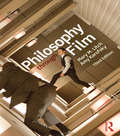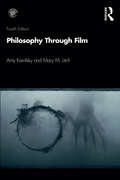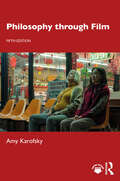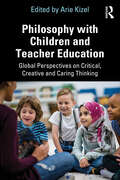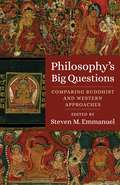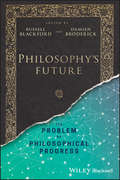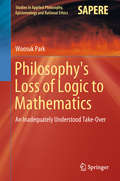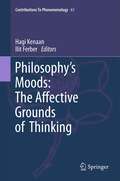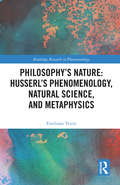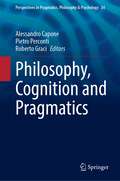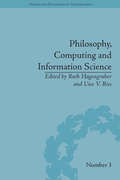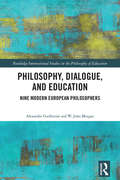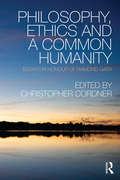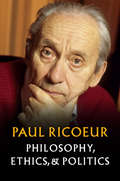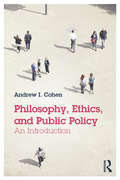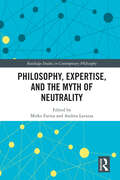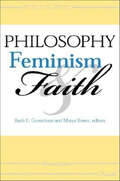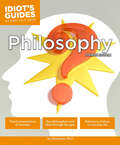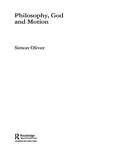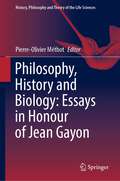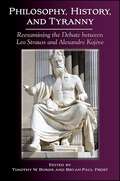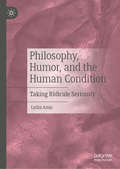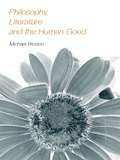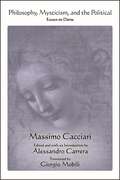- Table View
- List View
Philosophy through Film
by Mary M. Litch Amy KarofskyMany of the classic questions of philosophy have been raised, illuminated, and addressed in celluloid. In this Third Edition of Philosophy through Film, Mary M. Litch teams up with a new co-author, Amy Karofsky, to show readers how to watch films with a sharp eye for their philosophical content. Together, the authors help students become familiar with key topics in all of the major areas in Western philosophy and master the techniques of philosophical argumentation. The perfect size and scope for a first course in philosophy, the book assumes no prior knowledge of philosophy.? It is an excellent teaching resource and learning tool, introducing students to key topics and figures in philosophy through thematic chapters, each of which is linked to one or more "focus films" that illustrate a philosophical problem or topic. Revised and expanded, the Third Edition features: A completely revised chapter on "Relativism," now re-titled "Truth" with coverage of the correspondence theory, the pragmatist theory, and the coherence theory. The addition of four new focus films: Inception, Moon, Gone Baby Gone, God on Trial. Revisions to the General Introduction that include a discussion of critical reasoning. Revisions to the primary readings to better meet the needs of instructors and students, including the addition of three new primary readings: excerpts from Bertrand Russell’s The Problems of Philosophy, from William James’ Pragmatism: A New Way for Some Old Ways of Thinking, and from J. L. Mackie’s "Evil and Omnipotence". Updates and expansion to the companion website, including a much expanded list of films relevant to the various subfields of philosophy. Films examined in depth include:? Hilary and Jackie The Matrix Inception Memento Moon I, Robot Minority Report Crimes and Misdemeanors Gone Baby Gone Antz Equilibrium The Seventh Seal God on Trial Leaving Las Vegas
Philosophy through Film
by Mary M. Litch Amy KarofskyIn Philosophy through Film, Amy Karofsky and Mary M. Litch use recently released, well-received films to explore answers to classic questions in philosophy in an approachable yet philosophically rigorous manner. Each chapter incorporates one or more films to examine one longstanding philosophical question or problem and assess some of the best solutions that have been offered to it. The authors fully integrate the films into their discussion of the issues, using them to help students become familiar with key topics in all major areas of Western philosophy and master the techniques of philosophical argumentation. Revised and expanded, changes to the Fourth Edition include: A brand new chapter on the mind-body problem (chapter 4), which includes discussions of substance dualism, physicalism, eliminativism, functionalism, and other relevant theories. The replacement of older movies with nine new focus films: Ad Astra, Arrival, Beautiful Boy, Divergent, Ex Machina, Her, Live Die Repeat: Edge of Tomorrow, A Serious Man, and Silence. The addition of two new primary readings to the appendix of source materials: excerpts from Patricia Smith Churchland’s, "Can Neurobiology Teach Us Anything about Consciousness?" and Frank Jackson’s "What Mary Didn’t Know." The inclusion of a Website, with a Story Lines of Films by Elapsed Time for each focus film. The films examined in depth are: Ad Astra, Arrival, Beautiful Boy, Crimes and Misdemeanors, Divergent, Equilibrium, Ex Machina, Gone Baby Gone, Her, Inception, Live Die Repeat: Edge of Tomorrow, The Matrix, Memento, Minority Report, Moon, A Serious Man, Silence
Philosophy through Film
by Amy KarofskyThis fifth edition of Philosophy through Film uses recently released, well-received movies to explore answers to classic questions in philosophy in an approachable yet philosophically rigorous manner. Author Amy Karofsky uses two films in each chapter to examine one long-standing philosophical question and assess some of the best solutions to it that have been offered. The chosen movies are not mere “add-ons” to an otherwise straightforward introductory text; instead, they are fully integrated into the discussion of the issues and the various positions. Each chapter also includes discussion questions, an annotated list of films related to the chapter topic, and two or three historically significant primary sources (which are collected together at the end of the book).Changes to the fifth edition include: The replacement of older movies with four new focus films: Anatomy of a Fall, Everything Everywhere All at Once, Get Out, and The Time Traveler’s Wife. The addition of new primary readings from Roderick Chisholm, Jerry Fodor, Baron d’Holbach, and Susan Wolf. Important new sections added to Chapter 1 on Truth (“The Identity Theory of Truth”) and Chapter 5 on Artificial Intelligence (“The I in AI”). A major overhaul of Chapter 6 on free will, determinism, and moral responsibility. Updated notes throughout. The films examined in depth are: Ad Astra; Anatomy of a Fall; Arrival; Beautiful Boy; Crimes and Misdemeanors; Divergent; Equilibrium, Everywhere Everything All at Once; Ex Machina; Get Out; Gone Baby Gone; Her; Inception; Edge of Tomorrow; The Matrix; Memento; A Serious Man; Silence; The Time Traveler’s Wife.For a collection of Story Lines of the Discussed Films by Elapsed Time, visit: www.routledge.com/9781032544595
Philosophy with Children and Teacher Education: Global Perspectives on Critical, Creative and Caring Thinking
by Arie KizelThis rich collection of essays offers a broad array of perspectives from prominent international ‘philosophy for/with children’ (P4wC) scholars and practitioners regarding the interface between P4wC and teacher education and training curricula. The book considers the deep and varied points of contact that exist between the pedagogical and philosophical principles of the philosophical community of inquiry and teacher education and training programs. It is designed to help improve education systems worldwide as they seek to shift their attention towards the student, student inter-relations, and student-other relations and foster independent high-order, critical, creative, and caring thinking within democratic, pluralistic societies. It proposes an innovative, creative way of approaching teacher education and training—a central subject in today’s educational world. Offering diverse perspectives on integrating progressive educational philosophy and contemporary pedagogy, Philosophy with Children and Teacher Education is a must-read for all those studying philosophy for/with children and researching in this area.
Philosophy's Artful Conversation
by D. N. RodowickTheory--an embattled discourse for decades--faces a new challenge from those who want to model the methods of all scholarly disciplines on the sciences. What is urgently needed, says D. N. Rodowick, is a revitalized concept of theory that can assess the limits of scientific explanation and defend the unique character of humanistic understanding.
Philosophy's Big Questions: Comparing Buddhist and Western Approaches
by Dan Arnold Jan Westerhoff Rick Repetti Amber D. Carpenter Douglas S. Duckworth Stephen J. Laumakis Peter HershockCertain questions have recurred throughout the history of philosophy. They are the big questions—about happiness and the good life, the limits of knowledge, the ultimate structure of reality, the nature of consciousness, the relation between causality and free will, the pervasiveness of suffering, and the conditions for a just and flourishing society—that thinkers in different cultures across the ages have formulated in their own terms in an attempt to make sense of their lives and the world around them.The essays in this book turn to the major figures and texts of the Buddhist tradition in order to expand and enrich our thinking on these enduring questions. Examining them from a comparative and cross-cultural perspective demonstrates the value of alternative ways of addressing philosophical problems, showing how different approaches can produce new and unexpected kinds of questions and answers. Engaging with the Buddhist tradition, this book shows, helps return philosophy to its practical as well as theoretical aim: not only understanding the world but also knowing how to live in it.Featuring striking and generative comparisons of Buddhist and Western thought, Philosophy’s Big Questions challenges our thinking in fundamental ways and offers readers new conceptual tools, methods, and insights for the pursuit of a good and happy life.
Philosophy's Future: The Problem of Philosophical Progress
by Damien Broderick Russell BlackfordPhilosophy's Future: The Problem of Philosophical Progress diagnoses the state of philosophy as an academic discipline and calls it to account, inviting further reflection and dialogue on its cultural value and capacity for future evolution. Offers the most up-to-date treatment of the intellectual and cultural value of contemporary philosophy from a wide range of perspectives Features contributions from distinguished philosophers such as Frank Jackson, Karen Green, Timothy Williamson, Jessica Wilson, and many others Explores the ways philosophical investigations of logic, world, mind, and moral responsibility continue to shape the empirical and theoretical sciences Considers the role of contemporary philosophy in political issues such as women's rights, the discrimination of minorities, and public health
Philosophy's Loss of Logic to Mathematics: An Inadequately Understood Take-Over (Studies in Applied Philosophy, Epistemology and Rational Ethics #43)
by Woosuk ParkThis book offers a historical explanation of important philosophical problems in logic and mathematics, which have been neglected by the official history of modern logic. It offers extensive information on Gottlob Frege’s logic, discussing which aspects of his logic can be considered truly innovative in its revolution against the Aristotelian logic. It presents the work of Hilbert and his associates and followers with the aim of understanding the revolutionary change in the axiomatic method. Moreover, it offers useful tools to understand Tarski’s and Gödel’s work, explaining why the problems they discussed are still unsolved. Finally, the book reports on some of the most influential positions in contemporary philosophy of mathematics, i.e., Maddy’s mathematical naturalism and Shapiro’s mathematical structuralism. Last but not least, the book introduces Biancani’s Aristotelian philosophy of mathematics as this is considered important to understand current philosophical issue in the applications of mathematics. One of the main purposes of the book is to stimulate readers to reconsider the Aristotelian position, which disappeared almost completely from the scene in logic and mathematics in the early twentieth century.
Philosophy's Moods: The Affective Grounds of Thinking
by Ilit Ferber Hagi KenaanPhilosophy's Moods is a collection of original essays interrogating the inseparable bond between mood and philosophical thinking. What is the relationship between mood and thinking in philosophy? In what sense are we always already philosophizing from within a mood? What kinds of mood are central for shaping the space of philosophy? What is the philosophical imprint of Aristotle's wonder, Kant's melancholy, Kierkegaard's anxiety or Nietzsche's shamelessness? Philosophy's Moods invites its readers to explore the above questions through diverse methodological perspectives. The collection includes twenty-one contributions by internationally renowned scholars as well as younger and emerging voices. In pondering the place of the subjective and personal roots that thinking is typically called to overcome, the book challenges and articulates an alternative to a predominant tendency in philosophy to view the theoretical content and the affective side of thought as opposed to one another.
Philosophy's Nature: Husserl's Phenomenology, Natural Science, and Metaphysics (Routledge Research in Phenomenology)
by Emiliano TrizioThis book offers a systematic interpretation of the relation between natural science and metaphysics in Husserl’s phenomenology. It shows that Husserl’s account of scientific knowledge is a radical alternative to established methods and frameworks in contemporary philosophy of science. The author’s interpretation of Husserl’s philosophy offers a critical reconstruction of the historical context from which his phenomenological approach developed, as well as new interpretations of key Husserlian concepts such as metaphysics, idealization, life-world, objectivism, crisis of the sciences, and historicity. The development of Husserl’s philosophical project is marked by the tension between natural science and transcendental phenomenology. While natural science provides a paradigmatic case of the way in which transcendental phenomenology, ontology, empirical science, and metaphysics can be articulated, it has also been the object of philosophical misunderstandings that have determined the current cultural and philosophical crisis. This book demonstrates the ways in which Husserl shows that our conceptions of philosophy and of nature are inseparable. Philosophy’s Nature will appeal to scholars and advanced students who are interested in Husserl and the relations between phenomenology, natural science, and metaphysics.
Philosophy, Cognition and Pragmatics (Perspectives in Pragmatics, Philosophy & Psychology #34)
by Alessandro Capone Pietro Perconti Roberto GraciThis book contains essential contributions to enrich and broaden the application field of pragmatics. It provides an example of how the fruitful reflections and refined conceptual distinctions born in the philosophical field can find a practical application in addressing social, cognitive, clinical, and psychological problems. Its chapters address, from different points of view, the relationship between pragmatic linguistics and philosophy, and outline the possible application of pragmatic theories to different domains. Developed during the third Pragmasophia international conference, whose name is derived from the Greek terms πρᾶγμα (action, fact) and σοϕία (knowledge, science), the book aligns itself with its aim to study human actions and activities and how they take shape through language. But ‘Pragma’ and ‘Sophia’ also signal another purpose: highlighting the importance of creating links between empirical investigations on language use, and more traditional philosophical approaches. In this reading, ‘Pragma’ represents the experimental goal devoted to analysing and interpreting language facts. In contrast, the term ‘Sophia’ recalls the original vocation of past philosophers to pursue an ideal of ‘pure knowledge’, disconnected from any practical-economic interest. While maintaining the conference's original purpose of encouraging productive comparisons between different approaches, the book consists of two sections: first, on philosophical approaches, recalls more theoretical aspects (closer to the term ‘Sophia’); the second, ‘Inferential and Cognitive Pragmatics,’ addresses more practical issues affecting domains such as Greek literature, pragmatic disorders, dictionary entries, and speech analysis. The reader, whether in linguists, philosophy or psychology, obtains a complete overview of the most advanced current research lines, both theoretical and empirical, and thus contributes to broadening the scope of pragmatics.
Philosophy, Computing and Information Science (History and Philosophy of Technoscience #3)
by Ruth Hagengruber Uwe V. RissOver the last four decades computers and the internet have become an intrinsic part of all our lives, but this speed of development has left related philosophical enquiry behind. Featuring the work of computer scientists and philosophers, these essays provide an overview of an exciting new area of philosophy that is still taking shape.
Philosophy, Dialogue, and Education: Nine Modern European Philosophers (Routledge International Studies in the Philosophy of Education)
by Alexandre Guilherme W. John MorganPhilosophy, Dialogue, and Education is an advanced introduction to nine key European social philosophers: Martin Buber, Mikhail Bakhtin, Lev Vygotsky, Hannah Arendt, Emmanuel Levinas, Maurice Merleau-Ponty, Simone Weil, Michael Oakeshott, and Jürgen Habermas. This detailed yet highly readable work positions the socio-political views of each philosopher within a European tradition of dialogical philosophy; and reflects on the continuing theoretical relevance of the work of each to education generally and to critical pedagogy. The discussion in each chapter is informed by materials drawn from various scholarly sources in English and is enriched by materials from other languages, particularly French, German, and Russian. This enhances the comparative European cultural perspective of the book; and connects the work of each philosopher to wider intellectual, political, and social debates. The book will appeal to academics, postgraduates, and researchers working in philosophy, philosophy of education, and in educational, cultural, and social studies more generally. Advanced undergraduate students would also benefit from the book’s discussion of primary sources and the authors’ suggestions for further reading.
Philosophy, Ethics and a Common Humanity: Essays in Honour of Raimond Gaita
by Christopher CordnerThe work of Raimond Gaita, in books such as Good and Evil: An Absolute Conception, A Common Humanity and The Philosopher’s Dog, has made an outstanding and controversial contribution to philosophy and to the wider culture. In this superb collection an international team of contributors explore issues across the wide range of Gaita’s thought, including the nature of good and evil, philosophy and biography, the unthinkable, Plato and ancient philosophy, Wittgenstein, the religious dimensions of Gaita’s work, aspects of the Holocaust, and aboriginal reconciliation in Australia.
Philosophy, Ethics, and Politics
by Paul RicoeurIn this series of interviews and dialogues which took place between 1981 and 2003, Paul Ricoeur addresses some of the central questions of political philosophy and ethics: justice, violence, war, the environmental crisis, the question of evil, ethical and political action in the polis. Philosophical issues are brought to bear on present-day concerns and the practical realities of contemporary politics. How can the philosopher speak about politics without claiming superior insight or a higher order of knowledge? Ricoeur distinguishes three levels of society: ‘tools’ (modes of production and the accumulation of technology), ‘institutions’ (which are tied to national cultures) and ‘values’ (which claim to be universal). The philosopher’s task is to probe each of these levels and open up spaces for reflection, criticism and democratic deliberation. It is to explore the paradoxes of the political rather than invoking certainties dictated by conscience. Just as there no longer exists a grand narrative about the past, so too there is no longer any utopia capable of projecting the desired future. What remains is human creativity, which marks the source common to the institutional frameworks that are already present and the horizons that extend beyond them. The philosopher’s engagement lies in the promise to revive this source at the very moment it appears to dry up under the weight of the real. This volume of interviews and dialogues with one of the most important French philosophers of the post-war period will be of interest to anyone interested in the great political and ethical questions of our time.
Philosophy, Ethics, and Public Policy: An Introduction
by Andrew I CohenWhat makes a policy work? What should policies attempt to do, and what ought they not do? These questions are at the heart of both policy-making and ethics. Philosophy, Ethics and Public Policy: An Introduction examines these questions and more. Andrew I. Cohen uses contemporary examples and controversies, mainly drawn from policy in a North American context, to illustrate important flashpoints in ethics and public policy, such as: public policy and globalization: sweatshops; medicine and the developing world; immigration marriage, family and education: same-sex marriage; women and the family; education and Intelligent Design justifying and responding to state coercion: torture; reparations and restorative justice the ethics of the body and commodification: the human organ trade, and factory farming of animals. Each chapter illustrates how ethics offers ways of prioritizing some policy alternatives and imagining new ones. Reflecting on various themes in globalization, markets, and privacy, the chapters are windows to enduring significant debates about what states may do to shape our behavior. Overall, the book will help readers understand how ethics can frame policymaking, while also suggesting that sometimes the best policy is no policy. Including annotated further reading, this is an excellent introduction to a fast-growing subject for students in Philosophy, Public Policy, and related disciplines.
Philosophy, Expertise, and the Myth of Neutrality (Routledge Studies in Contemporary Philosophy)
by Andrea Lavazza Mirko FarinaThis volume offers a new framework for understanding expertise. It proposes a reconceptualization of the traditional notion of expertise and calls for the development of a new contextual and action-oriented notion of expertise, which is attentive to axiological values, intellectual virtues, and moral qualities.Experts are usually called upon, especially during times of emergency, either as decision-makers or as advisors in formulating policies that often have a significant impact on society. And yet, for certain types of choices, there is a growing tension between experts’ recommendations and alternative views. The chapters in this volume critically assess the idea of whether possessing epistemic authority can automatically make someone’s assertions necessarily more grounded than others. They not only evaluate the epistemological implications of this idea but also reflect on its ethical, socio-cultural, and political consequences. The interdisciplinary framework advanced across the chapters seeks to overcome certain limitations that underlie current models of expertise by adopting more inclusive and representative decisions that can improve the perceived neutrality of experts’ decisions. Increasing neutrality means reducing cases in which an unidentified bias – be it a scientific one or not – puts any of the individuals involved in a specific public choice at a systematic disadvantage.Philosophy, Expertise, and the Myth of Neutrality will appeal to scholars and advanced students working in epistemology, philosophy of science, philosophy of the social sciences, public policy, and sociology.
Philosophy, Feminism & Faith (Philosophy of Religion)
by Marya Bower Ruth E. Groenhout"The stories are powerful, sometimes heart-rending, sometimes lyrical, but always deeply personal. And there is some very good philosophizing as part of the bargain." —Merold WestphalHow can the seemingly separate lives of philosopher, feminist, and follower of a religious tradition come together in one person's life? How does religious commitment affect philosophy or feminism? How does feminism play out in religious or philosophical commitment? Wrestling with answers to these questions, women who balance philosophy, feminism, and faith write about their lives. The voices gathered here from several different traditions—Catholic, Protestant, Quaker, Jewish, and Muslim—represent diverse ethnicities, races, and ages. The challenging and poignant reflections in Philosophy, Feminism, and Faith show how critical thought can successfully mesh with religious faith and social responsibility.
Philosophy, Fourth Edition (Idiot's Guides)
by Jay StevensonA newly visual approach, this updated edition will include infographics, photos, and pull quotes to help reinforce learning of the subject of philosophy. Beginning with the pre-Socratics and Eastern philosophers, all of the major schools of thought are covered. Content includes religious philosophy, Renaissance humanism, enlightenment philosophers, idealism, existentialism, post-structuralism and post-modernism, and more.
Philosophy, God and Motion (Routledge Radical Orthodoxy)
by Simon OliverIn the post-Newtonian world motion is assumed to be a simple category which relates to the locomotion of bodies in space, and is usually associated only with physics. This book shows this to be a relatively recent understanding of motion and that prior to the scientific revolution motion was a broader and more mysterious category, applying to moral as well as physical movements. Simon Oliver presents fresh interpretations of key figures in the history of western thought including Plato, Aristotle, Aquinas and Newton, examining the thinkers’ handling of the concept of motion. Through close readings of seminal texts in ancient and medieval cosmology and early modern natural philosophy, the books moves from antique to modern times investigating how motion has been of great significance within theology, philosophy and science. Particularly important is the relation between motion and God, following Aristotle traditional doctrines of God have understood the divine as the ‘unmoved mover’ while post-Holocaust theologians have suggested that in order to be compassionate God must undergo the motion of suffering. The text argues that there may be an authentically theological, as well as a natural scientific understanding of motion. This volume will prove a major contribution to theology, the history of Christian thought and to the growing field of science and religion.
Philosophy, History and Biology: Essays in Honour of Jean Gayon (History, Philosophy and Theory of the Life Sciences #30)
by Pierre-Olivier MéthotThis book builds on recent scholarship highlighted in the edited collections, Philosophie, histoire, biologie: mélanges offerts à Jean Gayon (Merlin & Huneman, 2018) and Knowledge of Life Today (Gayon & Petit 2018/2019). While honoring the career and the thought of Jean Gayon (1949-2018), this book showcases the continued relevance of Gayon’s interdisciplinary work and illustrates his central place in the community of historians and philosophers of the life sciences.Chapters in this book address Jean Gayon’s intellectual trajectory from historical epistemology to the philosophy of biology, the nature and scope of his philosophical approach to the history of science, and his unique contributions to the history and epistemology of biological concepts and theories. Drawing on published and unpublished sources, the book explores some of Gayon’s most significant contributions to the philosophy, history, and social studies of biology.
Philosophy, History, and Tyranny: Reexamining the Debate between Leo Strauss and Alexandre Kojève (SUNY series in the Thought and Legacy of Leo Strauss)
by Timothy W. Burns; Bryan-Paul FrostOn Tyranny remains a perennial favorite, possessing a timelessness that few philosophical or scholarly debates have ever achieved. On one hand, On Tyranny is the first book-length work in Leo Strauss's extended study of Xenophon, and his "Restatement" retains a vivacity and directness that is sometimes absent in his later works. On the other, "Tyranny and Wisdom" is perhaps the most succinct yet fullest articulation of Alexandre Kojève's overall political thought, and it presents what may be the most uncompromising alternative to Strauss's position as a whole. This volume contains for the first time a comprehensive and critical examination of the debate from scholars well versed in the thought of Strauss, Kojève, Hegel, Heidegger, and the end of history thesis. Of particular interest will be the appendix, which offers for the first time Kojève's unabridged response to Strauss, a response previously available only from the Fonds Kojève at Le Bibliothèque Nationale de France. Accessible to students and scholars alike, this volume works equally well in the classroom and as a resource for more advanced research.
Philosophy, Humor, and the Human Condition: Taking Ridicule Seriously
by Lydia AmirThis book presents an original worldview, Homo risibilis, wherein self-referential humor is proposed as the path leading from a tragic view of life to a liberating embrace of human ridicule. Humor is presented as a conceptual tool for holding together contradictions and managing the unresolvable conflict of the human condition till Homo risibilis resolves the inherent tension without epistemological cost. This original approach to the human condition allows us to effectively address life’s ambiguities without losing sight of its tragic overtones and brings along far-ranging personal and social benefits.By defining the problem that other philosophies and many religions attempt to solve in terms we can all relate to, Homo risibilis enables an understanding of the Other that surpasses mere tolerance. Its egalitarian vision roots an ethic of compassion without requiring metaphysical or religious assumptions and liberates the individual for action on others’ behalf. It offers a new model of rationality which effectively handles and eventually resolves the tension between oneself, others, and the world at large. Amir’s view of the human condition transcends the field of philosophy of humor. An original worldview that fits the requirements of traditional philosophy, Homo risibilis is especially apt to answer contemporary concerns. It embodies the minimal consensus we need in order to live together and the active role philosophy should responsibly play in a global world. Here developed for the first time in a complete way, the Homo risibilis worldview is not only liberating in nature, but also illuminates the shortcomings of other philosophies in their attempts to secure harmony in a disharmonious world for a disharmonious human being.
Philosophy, Literature and the Human Good
by Michael WestonIn this provocative new examination of the philosophical, moral and religious significance of literature, Michael Weston explores the role of literature in both analytic and continental traditions. He initiates a dialogue between them and investigates the growing importance of these issues for major contemporary thinkers.Each chapter explores a philosopher or literary figure who has written on the relation between literature and the good life, such as Derrida, Kierkegaard, Murdoch and Blanchot. Challenging and insightful, Philosophy, Literature and the Human Good is ideal for all students of philosophy and literature.
Philosophy, Mysticism, and the Political: Essays on Dante (SUNY series in Contemporary Italian Philosophy)
by Massimo CacciariAmong today's Italian philosophers, Massimo Cacciari is perhaps the most assiduous commentator of Dante. Philosophy, Mysticism, and the Political collects all of Cacciari's writings on Dante to this day, from his masterful analysis of St. Francis of Assisi in Dante's Paradiso and Giotto's frescoes to a new consideration of Dante's "European" idea of empire as a federation of nations, peoples, and languages. Cacciari does not force Dante into any philosophical straitjacket. Rather, he walks with Dante, takes notes, asks questions, raises issues, and tries to understand the Divine Comedy in Dante's terms. Cacciari approaches Dante's Ulysses and the theologico-philosophical vertigo of Paradiso not as a critic but from the point of view of a faithful, assiduous, perceptive, sometimes perplexed, and sometimes worshipful reader. Cacciari's analysis shows once more that Dante does not belong to the past. Dante creates his own age and stays with us whenever we wish to follow his path.
